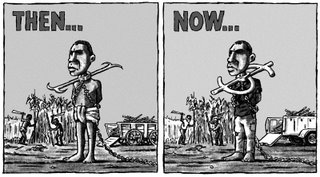As a nation, when did we relish exploitation as virtue?
When did we support EXPLOITATION by Government?
Why would we endorse and support WEALTH TRANSFER?
This defines how it's done:
Casino hosts turn to stats in rating players, giving comps
By Mark Gruetze
Published: Sunday, Feb. 2, 2014, 9:00 p.m.Updated 15 hours ago
That nice casino host who hands out free meals, concert tickets and fancy suites isn't paid to be a player's friend.
The host's primary job is to increase the casino's bottom line by getting gamblers to play and spend more, says Stephen R. Marshall, senior vice president of relationship marketing for the Fine Point Group, a gaming management and consulting company based in Las Vegas.
“If you're a host, your role should be to increase the casino's revenue,” Marshall says. He spoke last week at a webinar encouraging casino executives to adopt a data-driven approach to providing comps for their best customers.
The Fine Point Group began in 2005, founded by veterans of Harrah's Entertainment who had been deeply involved in gaming operations and marketing.
Keeping the big players happy is essential for any casino, Marshall says, adding that it's not unusual for 40 percent of a casino's gross gaming revenue to come from fewer than 10 percent of its customers.
[Harrah's, now Caesars, determined under Gary Loveman's genius that 90% of their profits came from 10% of the patrons, a statement never disputed by Caesars.]
Casinos judge players with statistics such as average daily value, or how much the casino expects to win each day a player visits, and cumulative value, which tracks a player's loss over several months or a year. A player who bets relatively small amounts but visits a casino several times a week might have a low daily average but a high cumulative total.
Marshall suggests that casinos track a player's action closely to determine his value to the casino. He recommends knowing the theoretical loss, which is based on the average bet, hours played and the house edge; the actual loss; days played; and total trips. Then casinos can identify their most valuable players and encourage them to return with offers of free play, comps and other amenities.
Understanding what casinos are looking for can pay off for players. Recognize your value to the casino. Never gamble more than you can afford simply to try to qualify for a particularly attractive comp; whatever it costs, it's cheaper to pay for it yourself than play over your bankroll in the hopes that the casino will pick up the tab.
Realize that no casino wants its big players to find another place more attractive.
“The No. 1 rule is to keep them away from the competition,” Marshall says.
He says a host's techniques should distinguish between “active” players who visit frequently and those who show up only once in a while. The host should use a “moderate” approach on those already visiting frequently, enough to keep them coming back, while being “aggressive” with the infrequent player in the hopes of turning him or her into a regular customer.
“Make clear: The relationship (between host and player) is a business relationship, not a personal relationship,” he says. The host is a salesman for the casino and should follow the ABC commandment: Always Be Closing.
Generally, casinos are said to return about 40 percent of a player's expected loss in comps. A blackjack player who bets $10 a hand and plays for four hours would have an expected loss of $48; that would mean comps of about $19.
However, Marshall recommends that executives know what nearby casinos offer and stay competitive. That means areas with little competition, such as Pennsylvania, won't necessarily have to be as generous as facilities in destination areas such as Las Vegas.
Marshall says the most common mistake for a host is focusing on the wrong customers, paying too much attention to those already loyal to a property instead of going after the player who will bring in new revenue.
“Ultimately, it's about making more money,” he says.







No comments:
Post a Comment